
Most Important Problem
In an open-ended format, roughly one-in-three Americans (32%) volunteer the situation in Iraq as the most important problem facing the nation. This represents twice as many people as a year ago, when the public’s outlook about Iraq was much more positive in the wake of Saddam Hussein’s capture.
When combined with terrorism, foreign policy and general security issues, about half the public (49%) cites a defense-related concern as the leading problem facing the nation. Roughly a quarter (24%) cite economic issues as most important, including unemployment, the deficit, and the state of the economy overall.
Democrats are more likely than Republicans to offer Iraq and economic problems particularly unemployment as most important while Republicans cite terrorism as a bigger concern.
Though no single social or domestic issue has become the focus of public attention, a number are mentioned by significant minorities. Health care and morality are each volunteered by 6% of respondents. Social Security, which was almost never mentioned earlier in Bush’s presidency, is offered as the most important issue by 4% of Americans.
GOP Strong on Security, Democrats on Foreign Policy
Overall, the public is evenly divided over whether the Republican party (36%) or Democratic party (35%) could do a better job handling the nation’s most important problem. But the parties’ strengths and weaknesses are more apparent depending on which issue a person volunteered as most important.
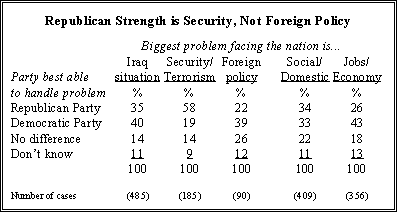
Security and defense issues remain the Republicans’ strong suits, though this does not extend to Iraq or foreign policy generally. By a 58%-19% margin, people who volunteer terrorism and homeland defense as the biggest problems facing the country say the Republicans, not the Democrats, are best able to address these issues.
Those who cite Iraq as the most important national problem are divided, with 40% saying the Democrats would do the best job and 35% trusting Republicans. And Democrats are favored by a 39% to 22% margin among the smaller number who sees foreign policy more broadly as the leading concern.
Democrats continue to be viewed as stronger on the economy. Among Americans who rate jobs or the economy as the biggest problems facing the nation, 43% think the Democratic Party can do a better job, while 26% say the Republican Party. Neither party has an advantage among those who mention other domestic or social issues.
Domestic Priorities Resurgent
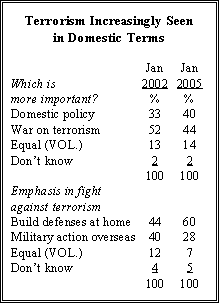
Although Iraq is mentioned most often as the single biggest problem facing the nation, domestic issues are more important to Americans than in any year since the 9/11 terrorist attacks. When asked whether President Bush should place more emphasis on domestic policy or the war on terrorism the public is divided today, in contrast with a clear preference for fighting terrorism in the wake of 9/11. And while defending against terrorism clearly dominated the list of domestic policy priorities in 2002 and 2003, it is just one among many highly ranked issues today, particularly for Democrats and independents.
There is a rising focus on a number of traditional domestic policy areas including health care, the deficit, and helping the poor and needy which declined in the public’s priority list in the wake of the attacks. In addition, the public’s priorities over whether to concentrate the war on terrorism at home or abroad have shifted. By about two-to-one (60%-28%), more Americans today say the priority in the war on terrorism should be building defenses at home to prevent future attacks rather than taking military action to destroy terrorist networks around the world. Three years ago, opinion was divided almost evenly (44%-40%) on this question.

Defending against terrorism and strengthening the nation’s economy lead the public’s policy agenda for 2005, with 75% saying these issues should be given top priority by the president and Congress. Insuring the stability of the Social Security system and improving education are close behind, with 70% rating each as top policy priorities for the coming year. Republicans, in particular, are placing a higher priority on stabilizing Social Security than in recent years. Nearly two-thirds of Republicans (65%) rate this a top priority today, up from 47% in 2002. This represents a closing of the partisan gap, as Democrats have consistently rated this as a top priority (75% currently, 76% in 2002).
Dealing with the problems of the poor and needy, which fell dramatically as a priority following the 9/11 terrorist attacks, has rebounded in the years since. Roughly six-in-ten (59%) say this should be a top priority for the president and Congress. This is up significantly from a low of 44% in January 2002, and nearly matches the 63% who cited helping the poor as a top priority in January 2001.
The question of providing health insurance for the uninsured has followed a similar pattern, plummeting in importance following the 9/11 attacks, but slowly rising again to near pre-attack levels. This increase is being driven largely by Democrats and independents. In particular, eight-in-ten Democrats (81%) view insuring the uninsured as a top priority, compared with just 56% at the beginning of 2002. By contrast, this issue has, if anything, faded slightly as a priority among Republicans. Consequently, the partisan gap over the importance of providing health insurance for all, already sizeable, has nearly doubled in the past three years.
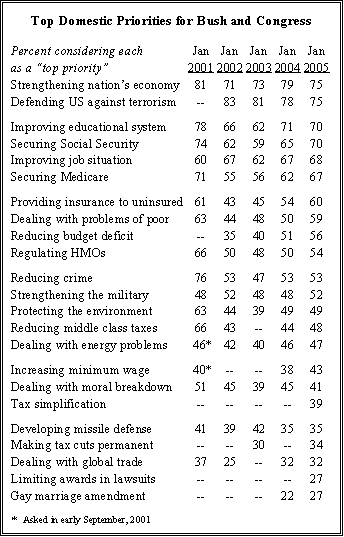
The budget deficit also has become an increasingly important issue 56% rank this as a top priority today, up from 51% a year ago and just 35% in 2002. However, public concern over the deficit remains lower than in the mid-1990s, when nearly two-thirds of Americans (65% in 1994) rated reducing the budget deficit a top policy priority.
Crime, Environment Still Lag
While the public has placed greater emphasis on addressing poverty and expanding health insurance, support for some other domestic priorities continues to lag behind pre-9/11 levels. Reducing crime, regulating HMOs and protecting the environment all of which were rated as top priorities by 60% or more before the terrorist attacks declined in importance after 9/11 and have seen little or no rebound in public interest since that time.
Consistent with previous Pew surveys, there also is no evidence that dealing with the nation’s moral breakdown is a greater public concern than in the past. Just 41% rate this as a top priority, compared with 45% a year ago and 51% at the start of the president’s first term.
With the exception of Social Security, a number of Bush’s announced policy objectives for the coming year rate relatively low on the public’s list of priorities. Most notably, passing legislation that would limit the amount of money that courts can award in personal injury lawsuits is seen as a top priority by barely a quarter of Americans (27%); the same number views passing a constitutional amendment prohibiting gay marriages as a major priority. The president’s two major tax proposals to make the 2001 and 2003 tax cuts permanent and to simplify the tax code rank slightly higher (34% and 39% top priority, respectively).

Parties Divide Over Priorities
There are stark differences in the policy priorities of Republicans and Democrats. Republicans place a far higher priority on terrorism (84% top priority vs. 66% for Democrats) while Democrats see the economy as more important (82% vs. 66%). Democrats are much more likely than Republicans to rank Social Security, Medicare, and education as top priorities for the coming year, though these are near the top of the list for Republicans as well.
But the partisan divide is most extreme over expanding government assistance for those in need. Among Democrats, 81% rate providing health insurance to the uninsured as a top priority, second only to strengthening the economy overall. Just 35% of Republicans give this issue as much emphasis. Increasing the minimum wage and dealing with the problems of poor and needy people are also far less important to Republicans than to Democrats.
At the other end of the spectrum, Republicans are more likely than Democrats to rate passing a constitutional amendment prohibiting gay marriage, making the tax cuts permanent, and strengthening the military as top policy objectives, though neither gay marriage nor taxes are high on either party’s list of priorities.
Both Democrats and Republicans have given the budget deficit higher priority in recent years, but the partisan gap on this issue is not narrowing.
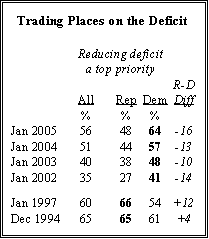
Dealing with the deficit is a much more important priority for Democrats than for Republicans, and this has been the case since George W. Bush first took office. This represents a notable shift from the 1990s, when Republicans rated the deficit as the higher priority.
Cautious on Social Security Overhaul
While a growing number of Americans consider the fiscal health of Social Security a top priority, the public is split over the current condition of the program. Nearly half (47%) believe it works pretty well and needs only minor changes; 34% think major changes are required; and 15% say the Social Security system has to be completely rebuilt.

The belief that Social Security is in need of fundamental change is most evident among people in their 30s and 40s. Nearly six-in-ten (57%) believe the system needs major changes (40%) or to be completely rebuilt (17%). Younger people those age 30 and under are less persuaded of the need for a major overhaul of Social Security. As expected, senior citizens generally believe the system works pretty well as it is; just 34% say it needs major changes or to be completely rebuilt.
There are no significant political or ideological differences in opinions on the state of Social Security about half of Democrats (50%) and Republicans (48%) believe the program works well and needs only minor changes. Pluralities of liberal Democrats (48%) and conservative Republicans (45%) also share that view.
Most Favor Keeping Guaranteed Benefit
Opinion is much more partisan about the idea of introducing private investment accounts into the Social Security program. But, attitudes on this issue also are highly dependent on how the proposal is framed.
In December, the Pew Research Center asked respondents how much they had heard about a proposal that would allow younger workers to invest some of their Social Security taxes in private retirements accounts, including stocks or mutual funds. Only about a quarter of Americans (23%) said they had heard a lot about the proposal, and another 43% said they had heard a little.
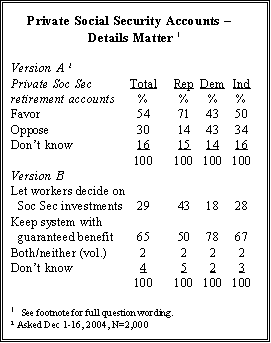
A majority of the public (54%) supported the concept of permitting younger workers to invest some Social Security taxes in investment accounts, while 30% were opposed. Opinion among those who indicated they heard a great deal about the proposal mirrored the general public’s, with 54% in favor.
But public opinion on the creation of private accounts in Social Security changes when the concept of investment risk is introduced. In the current survey, Pew asked a more detailed question on whether people favored “keeping Social Security as a program with a guaranteed monthly benefit,” or “letting younger workers decide for themselves how some of their own contributions” are invested, which “would cause their future benefits to be higher or lower” depending how those investments perform.
By greater than two-to-one (65%-29%), the public believes it is more important to keep Social Security as a guaranteed monthly benefit rather than it is to allow younger workers to invest some of their contributions, which may cause benefits to increase or decrease depending on how well they do. Support for a guaranteed monthly benefit has grown since fall 2000, when 54% supported this option.
In principle, Republicans overwhelmingly favor the idea of private accounts; by 71%-14% they support allowing younger workers to invest a portion of their Social Security taxes in private accounts. But when asked whether it is more important to keep a guaranteed monthly Social Security benefit than to permit younger workers to invest in private accounts, Republicans are divided; in this formulation, 50% favor keeping Social Security as a guaranteed benefit, while 43% support private accounts.
Democrats split evenly 43%-43% over the general proposal to allow workers to invest in private accounts. But by more than four-to-one (78%-18%), Democrats say it is more important to retain a guaranteed monthly Social Security benefit over a program than to permit younger workers to invest some payroll taxes in private accounts whose value could rise or fall with the market.
Foreign Policy Priorities

As was the case even before the Sept. 11 attacks, Americans see reducing the threat of international terrorism as the nation’s top foreign policy priority. Currently, 73% rate reducing the threat of international terrorism as a top priority. Comparable proportions ranked it as a top priority in both 1995 and 1999 as well.
By contrast, far fewer Americans (46%) rate the goal of making Iraq stable as a top policy priority. Stabilizing Iraq is of roughly equal importance with protecting the global environment (48% top priority) and keeping a close watch on the development of China as a world power (42%). More people rank stopping the spread of AIDS and international drug trafficking as top priorities than say the same about making Iraq stable.
As is the case with domestic issues, Democrats and Republicans have different views on what is most important in U.S. foreign policy. Among Republicans, fighting the war on terrorism and bringing stability to Iraq top the list, cited as top priorities by 82% and 59% of Republicans, respectively. While combating terrorism overseas is a top priority for two-thirds of Democrats as well, just 36% see making Iraq stable as a top U.S. priority. Instead, Democrats place far more importance on stopping AIDS and protecting the global environment.
Low Expectations for Iraqi Elections
Views of the war in Iraq continue to slip. The public is now evenly divided over whether the military effort is going very or fairly well (48%) or not too or not at all well (49%). Perceptions of progress in Iraq have been steadily declining since summer; in June, 57% thought things were going well there.

Moreover, there is little optimism that the upcoming Iraqi elections will change things for the better. Most Americans say they have heard at least something about Iraq’s elections, but fewer than half (46%) have heard a lot. A plurality of the public (49%) thinks the elections will do little to change the situation there; 29% think it will lead to greater stability; while 14% say it will make Iraq less stable.
Republicans are more optimistic than Democrats about the elections. But fewer than half of Republicans (46%) believe the elections will lead to greater stability in Iraq, while nearly as many (39%) expect little change. A majority of Democrats (55%) think the Iraqi elections will not make much difference, and as many think the elections will make Iraq less stable as say it will lead to more stability (18% each).
For the most part, fundamental attitudes toward the war have remained fairly stable. About half of Americans (51%) think the U.S. made the right decision to use force against Iraq while 44% disagree. The partisan divide on this measure continues to be substantial. More than eight-in-ten Republicans (84%) feel the war was the right decision, while 71% of Democrats say it was wrong.
A 54% majority think the U.S. should keep troops in Iraq until the situation has stabilized while about four-in-ten (41%) think troops should come home as soon as possible. That is about the same as in recent months. Eight-in-ten Republicans favor keeping troops in Iraq until it has stabilized while 61% of Democrats want the troops home as soon as possible.
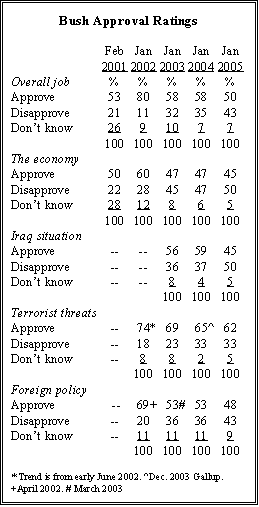
Public interest in news about Iraq has increased substantially since December. Currently, about half of Americans (48%) say they are tracking news from Iraq very closely. In December, only about a third expressed great interest in news about Iraq, the lowest mark recorded since the debate over war began in earnest in late 2002.
Bush at the Midpoint
President Bush begins his new term with half of the public approving of his performance in office; 43% disapprove. His overall job rating, along with approval in specific areas, has climbed somewhat from the nadir it reached in mid-October of the contentious campaign season. At that point, following the presidential debates, only 44% approved of Bush’s performance, while 48% disapproved.
The president continues to receive his best rating on handling terrorist threats. Currently, 62% approve, the same as in September 2004 and up 13 points from a low of 49% in October. He also gets more approval than disapproval on foreign policy (48% to 43%). But as has been the case for the past year, more people disapprove than approve of Bush’s handling of the economy (now 45% approve, 50% disapprove), and he gets identical marks for his handling of the situation in Iraq.
As yet, there is no public consensus on whether Bush’s presidency will be successful. Just over a third (36%) say he will be successful, while 27% think he will be unsuccessful, a figure that has grown significantly over the past two years. Republicans overwhelmingly are optimistic about Bush (72% say he will be successful); most Democrats who have an opinion think he will fail rather than succeed (48%-8%), but even among Democrats a significant number say it is too early to tell (41%).

Despite the strong public interest in the presidential election, only about third (34%) view Bush’s State of the Union address as more important than previous such speeches. That is the same level as last year, but far below the number who attached great importance to State of the Union addresses in 2003 and 2002 (52%, 54%, respectively).
The public has a similar sense of the importance of the president’s Jan. 20 inaugural address. About a third (34%) thinks his inaugural speech will be more important than in past years; 47% say it will be as important as past inaugurals; and 10% believe it will be less important. As with the State of the Union, Republicans view the inaugural address as more important than do Democrats.

Most Say Bush Influenced by Conservatives
At the beginning of Bush’s first term, nearly half of the public said he listened more to conservatives in his party than to GOP moderates (48% to 37%). In the aftermath of 9/11, fewer saw the president tilting to the conservative voices in his party, but the number who feel that way has grown steadily since then. Today, more than half of the public (54%) say he listens more to conservatives, while 27% thinks he listens more to moderates.
Among Republicans, a majority of conservative Republicans (54%) believe he is listening to their wing of the party, while a plurality of moderate and liberal Republicans (47%) see him paying more attention to their side. Among liberal Democrats, fully 84% think the president hews to the conservative side, an increase of 20 percentage points since January 2003.

The public views Vice President Dick Cheney as a more powerful figure than it did at the start of Bush’s presidency. A quarter of Americans say he has too much influence roughly double the number who said that in January 2001 (12%). But the number who say he has too little influence has also increased (from 12% to 18%).
Ideological perceptions of his second-term cabinet appointments are little different from those of Bush’s first term. Just a quarter of the public believes his appointments are too conservative, while 7% say they are too moderate and 45% say they are “about right.” As in 2001, nearly one-quarter of the public has no opinion on this question. Compared with four years ago, more Democrats now say the cabinet selections are too conservative, but even among Democrats less than a majority expresses this concern (42% now, 33% in 2001).
Bush’s overhaul of his cabinet has attracted little public interest. Just 18% of Americans say they followed Bush’s appointments very closely, the lowest interest for any news story this month. There was greater public attention to Bush’s cabinet selections four years ago, which is typically the case for newly elected presidents.
Public Still Sees Sluggish Economy
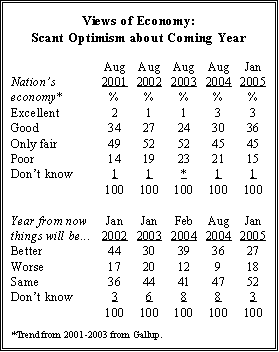
A majority of Americans continue to think that the economy is not in good condition, but the number who say it is in “poor” shape has declined to its lowest level in a year. Overall, 39% say the nation’s economic conditions are either excellent or good, while 45% describe them as only fair and 15% say they are poor. The percentage with a favorable view of the economy is somewhat higher than it was through most of President Bush’s first term, and is notably better than in the latter part of Bush’s father’s presidency.
But fewer people today than at any time since 2001 believe that economic conditions are going to be better a year from now. Just 27% are optimistic, while 18% think things will get worse. A majority of 52% expect little change. A solid majority of 58% continues to say that jobs in their community are difficult to find, while about a third (32%) think there are plenty of jobs available.
Americans’ views of their own family finances are more positive. Just over half (51%) describe their own financial situation as either excellent or good, with 34% saying “only fair” and 14% saying they are in poor shape. These numbers have changed very little over the past year and a half. Nearly two-thirds (64%) expect their family financial situation to improve at least a little over the next year; 18% expect it to get worse.

More affluent people have more sanguine views about the condition of the economy, though even among people with family incomes above $75,000, more describe the economy and the job situation as bad than good. But especially on the question of the availability of good jobs in the community, the perceptions of the lowest and highest income groups are sharply different. Not surprisingly, lower income respondents are very apt to describe their family financial situation as only fair or poor.
Republicans and Democrats have very different views of the economy as well. A large majority of Republicans (62%) say economic conditions in the country are good, and 68% say the same about their own financial situation. Half see a favorable job market in their local community. By contrast, just a quarter of Democrats think the national economy is in good shape, and only 41% are happy with the state of their own finances. Just 17% think jobs in their community are easy to find. On each of these questions, independents tend to fall between Democrats and Republicans, but are closer in their views to those of the Democrats.
Public Response to Tsunami Tragedy
News about the disastrous tsunami in the Indian Ocean has been followed more closely by the American public than any other major foreign news story over the past seventeen years.2
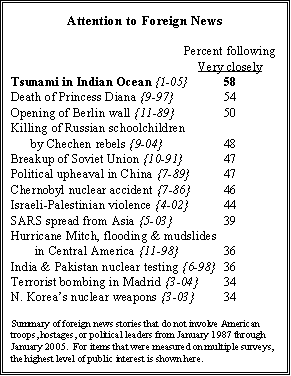
Nearly six-in-ten Americans (58%) have tracked news from south Asia very closely; the next highest foreign stories were the death of Princess Diana in 1997 (followed very closely by 54% of Americans) and the opening of the Berlin Wall in 1989 (50%).
Attention to news about the tsunami and flooding in Indonesia, Sri Lanka and other Asian countries is even high relative to disasters closer to home. More Americans tracked news of the tsunami very closely than followed news about hurricanes hitting Florida and the Southeast this past summer very closely (52%).
The global tragedy has captured the interest of all demographic groups, though, as is the case with news of almost all types, young people are considerably less attentive. Roughly half (49%) of people under age 30 followed this story very closely, compared with 72% of those age 65 and older.
Three-in-ten Americans say they have made a donation for the relief effort and the same number say they plan to do so. Donations came most often from the college educated, the affluent and Americans living in the East and West.
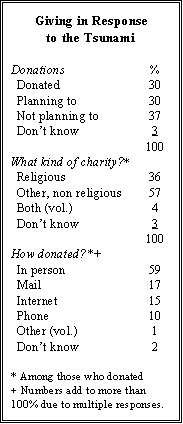
Donations to the relief effort have come from both sides of the political spectrum, with Democrats, Republicans and political independents all about equally likely to have made a donation. And despite not following the story as closely, nearly a quarter of young people (24% of those under age 30) have given, compared with 31% of those age 30-49 and 32% of people 50 and older (See pg. 26 for more details).
Among those who have made a donation, 36% have given to a church or other religious organization, 57% have given to some other kind of charity, and 4% gave to both. Most of those who report having made a donation (59%) said they did so in person. Donations via the mail (17%) and Internet (15%) are about equally common. Another 10% made donations over the phone.
People who attend religious services once a week or more are somewhat more likely to have made a donation in response to the tsunami than those who attend less often; 34% of weekly attenders made a donation compared to 28% of those who attend services less often. But frequent church attenders were far more likely to make their donation to a church or other religious organization. The majority of weekly church attenders who made a donation gave to a church or other religious organization (57%), while 32% gave to non-religious groups and 9% gave to both. Less frequent church goers mostly gave to non-religious organizations (by a 75 to 21% margin, with 1% giving to both).
Most See U.S. Aid As Sufficient
Nearly half of Americans (48%) consider the U.S. government’s response to the relief effort to be about right, 36% say the U.S. has done more than its fair share and just one in ten say the U.S. has done less than its fair share. Republicans are more likely than Democrats to think the U.S. has done more than its fair share in the relief effort (46% to 28%), however.

Conservative Republicans are particularly likely to think the U.S. has done more than its share to help. Half of conservative Republicans take this position compared to 36% of moderate and liberal Republicans. Liberal Democrats diverge strongly from this perspective with just 18% thinking the U.S. has done more than its fair share and 28% saying the U.S. has done less than its share.

